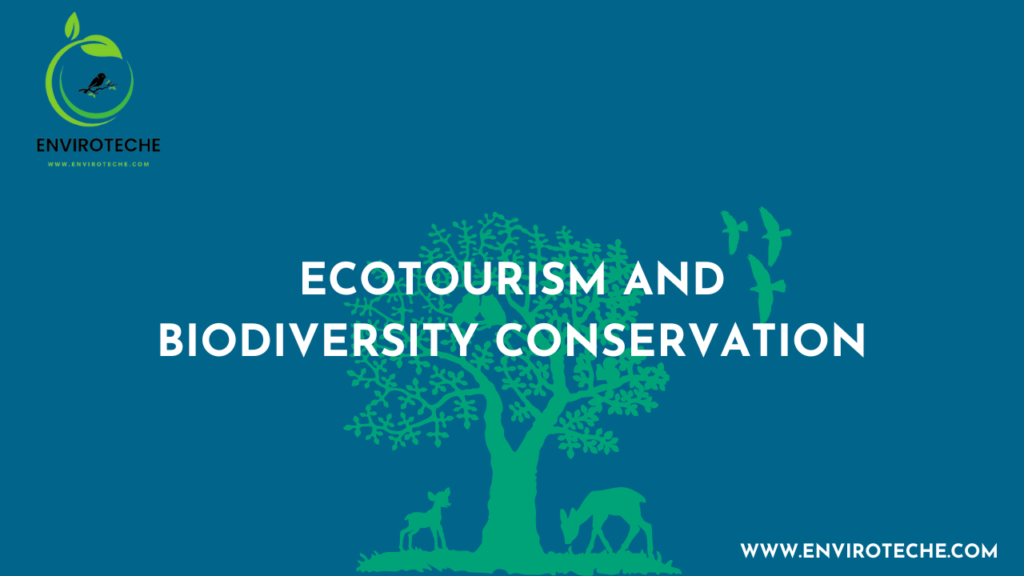
Nimra Ather1, Muhammad Qasim2
Department of Zoology, University of Agriculture Faisalabad1
Department of Environmental Sciences, Government College University Faisalabad2
Introduction:
The goal of ecotourism is to lessen the harmful effects on the environment and to support conservation initiatives. It entails going to natural regions and doing things that don’t hurt the ecology but rather help to preserve it. On the other hand, biodiversity conservation refers to the safeguarding of various plant and animal species as well as their habitats. In order to guarantee the survival of species for upcoming generations, it is imperative to maintain an ecosystem that is healthy and balanced.
What is Ecotourism?
Understanding natural environments while minimizing adverse effects on the environment and nearby populations is the goal of ecotourism. It encourages education and conservation as a sustainable kind of travel. Nature hikes, bird viewing excursions, wildlife safaris, kayaking, and other eco-friendly pursuits are examples of ecotourism activities. Ecotourism’s primary objectives are to advance environmental education, environmental protection, and sustainable development.
Biodiversity Conservation
The preservation of a region’s rich variety of species of plants and animals is known as biodiversity conservation. The continuing existence of numerous species, including humans, as well as the health of the world depend on biodiversity. However, a variety of human activities, such as overfishing, pollution, and deforestation, pose a threat to biodiversity.
The Benefits of Ecotourism and Biodiversity Conservation
Numerous advantages of ecotourism exist for the environment as well as for nearby communities. Among the main advantages of ecotourism are:
- Conservation of Biodiversity: Ecotourism offers financial incentives for conservation, which aids in the preservation of natural habitats and species. Fees, gifts, and taxes collected from visitors are used to do this.
- Community Development: Through the creation of jobs, the selling of regional goods, and the supply of visitor services, ecotourism can boost the local economy.
- Economic benefits: Ecotourism can give local people another source of income, lessening their reliance on harmful activities like logging and hunting. This could enhance local economies and generate employment in the travel and tourism sector.
- Environmental benefits: Promoting ethical travel habits through ecotourism can assist to lessen its detrimental effects on the environment. Ecotourism can help to safeguard natural resources and lower the risk of habitat loss and degradation by supporting conservation efforts.
- Educational benefits: Ecotourism can give visitors the possibility to learn and understand the significance of conservation and the imperative to preserve our planet’s natural resources. This can encourage sustainable behavior and help to increase understanding of environmental challenges.
- Cultural benefits: Ecotourism may offer visitors the possibility to acquire knowledge about local traditions and customs. This could encourage cultural interchange and aid to maintain cultural heritage.
- Health benefits: Ecotourism can give visitors the chance to be active and spend time in nature, which can have many positive effects on their health, including lowering stress and enhancing mental health.
- Scientific benefits: Ecotourism can give scientists the chance to study ecosystems and wildlife, which can advance our knowledge of the natural world and guide conservation efforts. Conservation of natural habitats, such as wetlands, coral reefs, and forests, is referred to as habitat conservation.
- Species conservation: The preservation and management of specific species, such as those that are threatened or endangered.
- Sustainable use and management: The wise use and management of all natural resources, such as fisheries, forests, and farmland.
- International cooperation: Cooperation between nations can tackle global environmental concerns, such as biodiversity loss and climate change.
- Successful Ecotourism Initiatives
- Around the world, there are numerous ecotourism projects that are successful. Here are a few examples:
- The Galapagos Islands, in Ecuador: The Galapagos Islands are one of the world’s most biodiverse locations and a UNESCO World Heritage site. On the islands, ecotourism is a major sector, and visitors must adhere to stringent environmental regulations to reduce their environmental impact.
- • The Masai Mara, Kenya: The Masai Mara is a national reserve in Kenya where a wide variety of species, such as lions, elephants, and giraffes, can be found. The Masai locals who serve as guides and offer lodging and other services to tourists rely heavily on ecotourism as a source of income.
- Ecotourism has benefited local communities in Costa Rica by promoting economic growth while preserving the nation’s rainforests and wildlife.
- In Namibia, ecotourism provides contributed to protecting wildlife and habitats, meanwhile generating income for rural populations.
- • Ecotourism has aided in the preservation of the distinctive flora and fauna in the Galapagos Islands while offering travelers educational opportunities.
Challenges and Solutions for Ecotourism and Biodiversity Conservation
Additionally, boosting ecotourism and biodiversity preservation has several difficulties. Over tourism, ecological damage, and climate change are a few of these problems. Promoting sustainable tourism practices, such as responsible waste management, energy conservation, and water conservation, is crucial to addressing these issues. In order to make sure that the advantages of tourism are distributed fairly, it is also crucial to interact with local stakeholders and communities.
Conclusion
The preservation of biodiversity and ecotourism have several advantages for the environment and nearby communities. We can contribute to the protection of our planet’s natural resources and ensure a sustainable future for future generations by encouraging ethical travel habits and encouraging conservation initiatives.
Biodiversity Conservation Biodiversity Conservation Biodiversity Conservation Biodiversity Conservation Biodiversity Conservation
Check Other Schlorships:
